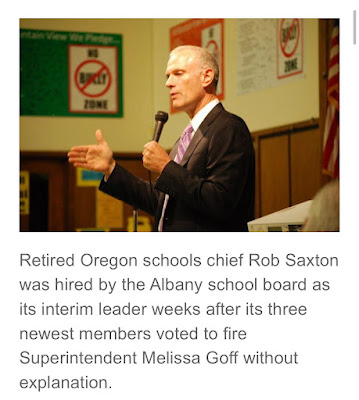Linfielder Rob Saxton leads Albany (Oregon) school district as superintendent
Story below based on a story in Portland’s Oregonian includes mention of Rob Saxton. He is a former Linfield quarterback and son of Cliff and LaRene Saxton, both of whom attended Linfield. Cliff, who played football for Linfield, is a member of the Linfield Athletics Hall of Fame.
Linfielder Rob Saxton, retired Oregon schools chief was hired by the Albany (Oregon) school board as its interim leader weeks after its three newest members voted to fire Superintendent Melissa Goff without explanation says the 7/27/2021 Oregonian.
“There’s no one better,” board member Pete Morse said of Saxton, according to the Oregonian.
The Oregonian said:
-Saxton spent his early career as a high school teacher and administrator in Albany before being hired by the McMinnville district and then becoming superintendent in Sherwood and, later, Tigard-Tualatin.
-In 2012, then-Gov. John Kitzhaber chose Saxton to become Oregon’s first appointed schools chief, after the last elected one, Democrat Susan Castillo, left for a job with a national education nonprofit.
-Saxton left the state position in 2015 to lead the Northwest Regional Educational Service District. He retired from that role in 2019 and, at age 61, runs a consulting firm that most recently advised the Eugene district on its search for an interim superintendent.
-The Albany board received about 100 written comments ahead of Monday’s meeting, the vast majority in support of hiring Saxton as the district’s interim superintendent.
The Oregonian also said:
- Some community members in their written testimony expressed concern that Saxton’s son, Sean, is an assistant principal at West Albany High.
-Several others asked whether Saxton would push for social distancing and masking for the coming school year.
-He was noncommittal in his response during Monday’s meeting, citing the difficulties superintendents and state officials have had in setting policies as the pandemic unfolded over the last year.
-“I think it’s important for us to listen to experts and move forward with all due caution,” Saxton said.
-Wilson asked Saxton about his approach to equity, particularly in regard to neurodivergent students — or those on the autism spectrum or with other non-typical neurologies — and pupils in the talented and gifted program. Saxton told the board he would start by identifying whether students of color had proper representation in the latter.
-“If we see a real disparity in who’s in TAG, then we’ve done something wrong,” Saxton said, adding that any approach to addressing inequity should be “additive.” “You can’t take away.”
-The board voted 4-1 to hire Saxton.
-Michael Thomson, the lone dissenting voice, didn’t take issue with Saxton’s credentials. Instead, he told his peers they acted too hastily in finding a replacement for Goff.
-“We’re interviewing one guy who’s got connections to Albany,” he said. “One person, yes or no. He’s not a bad guy but he’s got to take some time off in August. I don’t get it. I just don’t get it.”
-Although Saxton’s hiring was immediate as of the board’s vote, the incoming superintendent took off for an out-of-state trip at 3 a.m. Tuesday. He’ll be gone until Aug. 6.
-Then on Aug. 16, Saxton will be gone for another 10 days. All told, he’ll be in Albany for eight working days that month.
-“Unfortunately, he had some pre-planned adventures outside of the state,” Wilson said.
-Paul Dakopolos, the district’s legal counsel, advised board members to approve Saxton’s hiring on Monday night. But he told the five men they should host another meeting Wednesday to give the public a chance to comment on Saxton’s $150,000 contract before voting on it.
-Instead, the board also voted 4-1 to rubber stamp the agreement.
-The contract includes a $500 monthly vehicle allowance and $2,500 for technology. Saxton said the tech stipend will offset the costs of a cell phone he’ll use for district business and to pay for his home internet.
-The district will pay Saxton’s health insurance for two years after he leaves the superintendent post. Saxton also won’t be eligible to take the job permanently, not that he wants it.
-“You should move and get me back to retirement as soon as possible,” he told the board.
-Saxton’s contract runs through the end of the coming school year and he estimates his insurance will cost about $15,000 for the year, putting the agreement’s total cost closer to $168,000.
-Goff, whom the board fired on a 3-1 vote, earned a base salary of $181,000.
-Saxton’s hiring as Albany’s interim superintendent is the latest twist in a tumultuous time for the district of about 9,000 students.
-Months ago, Goff and her deputy superintendent accused board member Eric Aguinaga of disrespecting staff and leaking confidential information. An internal report backed up their claims.










